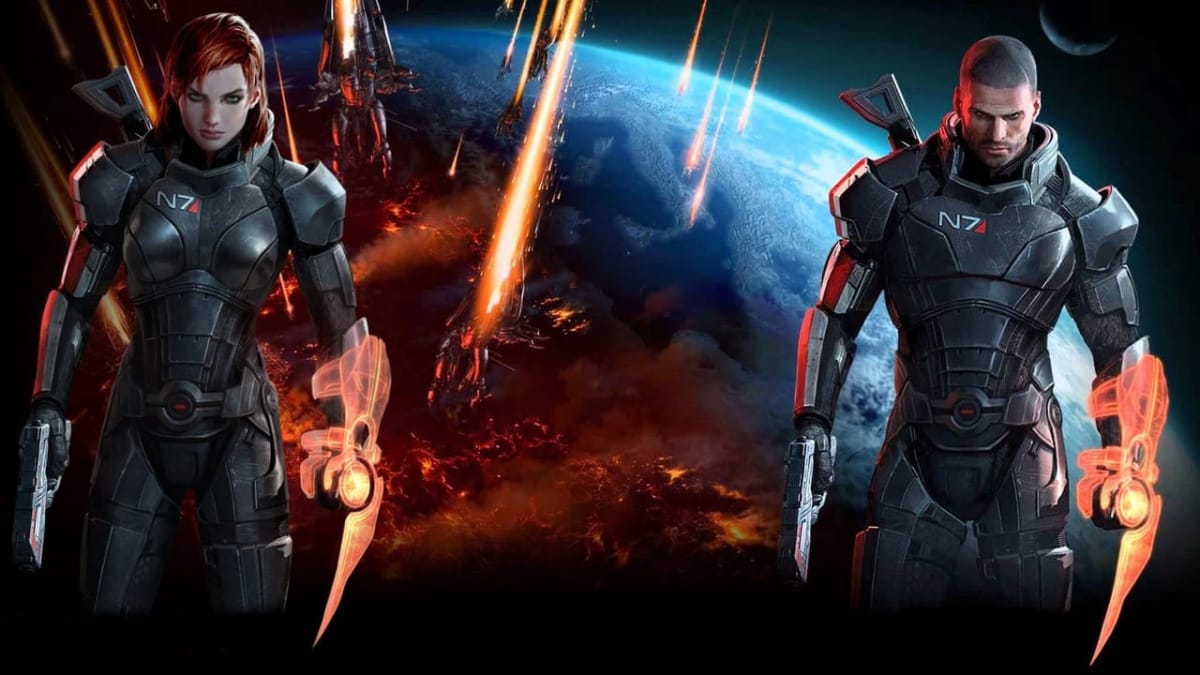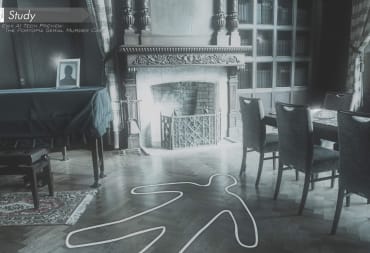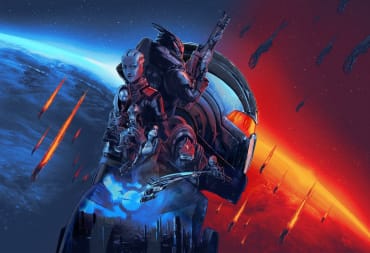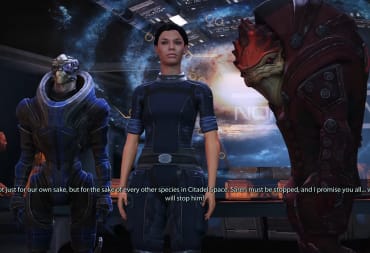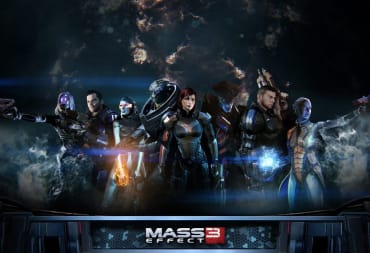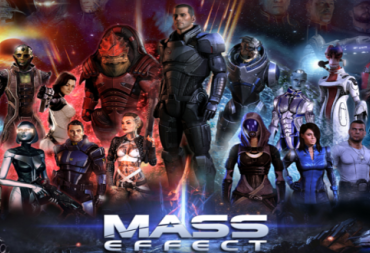And when he opened the seventh seal, there followed a silence in heaven about the space of half an hour. And I saw the seven angels that stand before God; and there were given unto them seven trumpets. And another angel came and stood over the altar, having a golden censer; and there was given unto him much incense, that he should add it unto the prayers of all the saints upon the golden altar which was before the throne. And the smoke of the incense, with the prayers of the saints, went up before God out of the angel's hand. And the angel taketh the censer; and he filled it with the fire of the altar and cast it upon the earth: and there followed thunders, and voices, and lightnings, and an earthquake. And the seven angels that had the seven trumpets prepared themselves to sound. And the first sounded, and there followed hail and fire, mingled with blood, and they were cast upon the earth.Revelation 8: 1-7
When Commander Shepard was named for the original Mass Effect, it was as a tribute to astronaut Alan Shepard for being one of the first people ever to fly in Space. Shepard was symbolic for BioWare in 2007 for the role he could play in the space opera they were creating, but Shepard’s name also serves as a second meaning: a biblical one.
This is the fourth in a four part series looking at Mass Effect characters Garrus, Mordin, Legion, and Commander Shepard. With Character Select, the goal is to showcase some of the best video game characters ever made and dissect why they are memorable. You can find more of them here.
In the final scene of Mass Effect, a child asks their grandparent while gazing at the stars on a distant planet to “tell them another story about The Shepard.” It is an important moment because it reframes Shepard completely into their biblical role, whatever that role may be. Shepard is no longer just a Commander, a human, or even a reference to an astronaut. Shepard is now an important figure in the Galaxy’s theology, and this in turn focuses on Shepard’s role as a character throughout the trilogy.
So how do we define Shepard, when their function as a character is an avatar for the player? Since Mass Effect is an RPG, the game itself is wholly defined by several hallmarks of the genre. All the customizable aspects of Shepard—their backstory, class and gender—combine with the player's moral choices in-game. It is a hallmark of an RPG to give the player agency for their actions. What sets Shepard apart, however, is how the game purposefully takes agency away from the player at times in service to the main plot.
Shepard is a hybrid character, a sort of "new breed" of RPG protagonist that has a clearly defined role and at times personality, with many aspects that are customizable by the player. In-between determined characters such as Geralt and blank slates like the Dragonborn, BioWare has mastered this kind of character since Baldur’s Gate.
In fact, much of the BioWare catalogue is filled with hybrid characters. The cliched "chosen one" motif that BioWare typically employs rings true in many games they have developed, but BioWare was always clever in their presentation. Mass Effect is no different, as what makes the narrative here significant is how this gives the developers the ability to weave thematic elements into the gameplay and narrative.
The death of Shepard in Mass Effect 2 is emblematic of this meshing of theme and mechanic. While obviously an overt reference to the story of Lazarus and the Resurrection of Jesus, it also services the narrative structure of the game, allowing the player to "respec" their character to begin the game at level one. It ties these elements together on a surface level, but thematically, the rebirth of Shepard adds a new dimension to the character that holds out to the trilogy's climax.
Shepard’s resurrection is often seen as the beginnings of the series’ biblical themes, but Mass Effect was already tied to theology in subtle ways through the Reapers themselves. Shepard and the Reapers are explicitly linked, not only in a protagonist/antagonist sense, but also through the roles they play in theology. The starkest example is on Virmire, with the conversation Shepard has with Sovereign, the Reaper vanguard. Sovereign is the first hint of the Reapers role in the trilogy:the bringers of the apocalypse, the angels of God ushering in a grand change.
The Apocalypse is more than just a reference to the end times. In theology, it serves as a form of literature that often uses symbolism to describe the death and rebirth of the world. The key point is not the destruction of the world, but the aftermath. See, apocalyptic literature is often a prophetic metaphor for what becomes the next “revelation,” the reveal of truth through communication with a divine figure. It then serves as a tale of God's wrath, but also rewarding the faithful with paradise, a new Utopia.
Take, for example, the story of Noah and the Flood in the Old Testament. Many theologians view this as an apocalyptic story, where God instructs Noah to build an ark as he reverses his own creation of the world. Noah, along with his family and other animals, survive the great flood and repopulate the world, leading to a rebirth of man and a new creation—a utopian vision that has washed away the sins of the world.
Sovereign, of course, is the first bringer of truth to Shepard. It states “we impose order on the chaos of organic evolution. You exist because we allow it, and you will end, because we demand it.” It is the first hint at their grander plan, the harvest of organic life for a purpose that is beyond comprehension to organics. Sovereign admits they have no beginning, no end, that their motives are above the means of mortality. Sovereign, and the Reapers in general, are the angels of God, heralding the apocalypse by God's own design.
So how does Shepard fit into this? As the player, their job is to stop the apocalypse, but as a hybrid character, the course of action to do so is undetermined. This adds another dimension to the game by tying the player's journey into every choice that can be made to service this thematic arc. Shepard is a leader, a charismatic force of personality, and the only character who has a hand in the outcome of all these character and thematic elements.
In all three previous articles, the actions of Garrus, Mordin, and Legion are tied explicitly to Shepard and the choices by the player. It is Shepard that can encourage or discourage Garrus’ personal path to redemption. Shepard can deny Mordin's agency. Shepard can allow Legion to become a messiah. It is the player's choices through Shepard that ultimately decide the thematic narrative of the Mass Effect trilogy. This is expected for an RPG; the main character is after all the only character with full-blown agency. Choices have consequences in Mass Effect, a hallmark of most role-playing games. While many criticize the lack of their choices impact in the trilogy, on the thematic level, these choices give Shepard a deeper understanding of the game's themes that become the exclamation points of Shepard’s character arc.
Legion's loyalty mission in Mass Effect 2 is a good example of this. Legion, once again viewing Shepard as a messianic figure, asks Shepard to make a tough ethical decision, to either destroy a cluster of Geth Heretics possessing a virus designed to brainwash other Geth or to use the virus on the heretics themselves, brainwashing them in the process. The ethical question here falls upon how Shepard sees the situation. Are they willing to destroy these Heretics because of their beliefs? Does Shepard respect the idea that the Geth are more than just synthetics? It is a choice where the mortality is extremely fluid, and for Shepard, it can be a choice that is difficult but necessary to make.
All the missions in the trilogy offer several difficult and ethical choices that not only define the characters around Shepard, but the player's view of Shepard and the world. How willing is Shepard to genocide a species? How quick is he to take an advantage against insurmountable odds? The inclusion of paragon and renegade interrupts theadd reactive actions as well, allowing Shepard to become a pro-active character in the moment by moment choices made in-game.
This dictates the type of Shepard we see, but what ties this into the game’s biblical themes is the actions Shepard must take when the Reapers come in full force. Think of each choice as another revelation, a gaining of knowledge or universal truth into the psyche of the player's character. Shepard must wage a war against the encroaching apocalypse, using every revelation to fight back against them. It is a fight that Shepard knows is impossible to win, and the toll of that begins to rise as the game uses its cinematic prowess to showcase the devastation.
The opening of Mass Effect 3 is extremely effective in setting the game's tone. Like the Book of Revelation describes, we hear the thundering trumpets, intermingled with beams of light and balls of fire from the sky. The end times has arrived in Mass Effect 3, and God’s angels have begun the harvest to bring forth a new world.
The question of course, though, is who is God in this case? If the Reapers are his angels, then there are only two possibilities as to who God can be: the Leviathan or the Catalyst. The Leviathan was the original “apex” race, a creature who enthralled other races and worshipped as a God across the galaxy. Its creation of the Catalyst was due to hubris, believing that the Reapers would solve for them the unexplained conflict between organic and synthetic life.
The Catalyst is the direct consciousness of the Reapers, the original AI by the Leviathan to solve the problem. As an AI, the Catalyst is beholden to the cold machine logic of its programming, but its decision to rebel against Leviathan follows a very similar path as not only the Geth and the Quarians, but of rebellion against God by his followers, or even more boldly, Lucifer from Paradise Lost.
If the Leviathans are God, then they are the Gods of Paganism and ancient Religious Cults. Pro-active, vengeful, covetous beings whom are all knowing and all powerful, and whom disappear from memory when the Catalyst usurps them. In Abrahamic traditions, the Catalyst represents the monotheistic belief in God the beginning and end, the Alpha and Omega—the title given to Christ in Revelation.
The cycles that the Reapers force throughout the Galaxy is a reconstruction of multiple apocalyptic events, with the Catalyst ultimately playing God and the Reapers their literal Harbingers. The Catalyst, as projected by the Reapers, is seemingly all knowing, its methods alien to the organic mind. The cycle is not just an apocalypse, but a continuous rebirth of the Galaxy while the Reapers preserve the knowledge and ascend to the heavens. A Utopia that is preordained by design.
Shepard’s Role, then, is to serve the same role as all the varying philosophies seen at this point. Does humanity, and by extension, organic life, have free will? The Catalyst argues that the order it imposes pushes back against the Chaos of free will. Free will is an illusion to the Catalyst, especially when you consider how the Galaxy itself is specifically set up to ensure the cycle of apocalypse continues.
Yet Shepard becomes the anomaly, the one X factor in the Catalysts’ plans. After the final confrontation with The Illusive Man, the death of Admiral Anderson, and Shepard’s "ascension" into the heavens of the Citadel, the Catalyst gives Shepard a profound choice: what is the future of organic life?
The endings of Mass Effect 3 are often criticized for being simultaneously convoluted yet incredibly vague at the same time. From a mechanical sense, yes, they are somewhat separate from the main game and the consequence, upon release at least, was not fully seen, only implied. The extended cut, however, has changed that. In the new light there, we see more closure and a greater glimpse of what the three primary endings to the game really mean because of Shepard’s choice. Arguments of the games ending not providing proper or logical closure to the trilogy, I would argue, miss the mark of the problems with the ending. If anything, the endings suffer from being too logical in their focus. From a pacing sense, they fail because of the player expectation being different than BioWare’s thematic vision.
In a philosophical sense, the final choice is not only a perfect ending, but one that wraps up the biblical themes. When Leviathan created the Catalyst, it tasked it to solve the problems of organic and synthetic life, to find peace for all beings in the galaxy. The Catalyst offers the same choice to Shepard; options that, depending on how Shepard may have dictated their own choices throughout the trilogy can influence the final choice here. God has bestowed the destiny of man in us, and through this final revelation, Shepard must dictate the future of the Galaxy.
In effect, the three main endings to Mass Effect 3—control, destroy, and synthesis—have been staring at us all along throughout the game. All three endings tie into the general philosophy of the game's themes. All three endings lead to the rebirth of the Galaxy, and all three, much like many of the biblical themes, mesh well with the overall themes. The apocalypse ends, the world is born anew, and the sacrifices made by not only companions to Shepard but of Shepard’s own action is what is rightfully remembered. The choice Shepard makes is not out of left field, it has been seeded throughout the trilogy and funneled into Shepard’s ultimate role in the franchise: becoming God in control, striving for individual freedom with destroy, or being the messiah for the entire galaxy through synthesis.
While the three primary endings fit snugly into the game's core biblical themes, the last ending, Refuse, also needs to be addressed. The refuse ending, added in the extended cut, is where the outcome leads to the next cycle simply making the choice for themselves. Refuse as an ending is the rejection of all the choices given, and in so doing it can be analogous to those who reject God at the coming of the rapture. It is Shepard's actions that help inform the next cycle, who made the decision instead of Shepard. It is the next cycle that experiences its own rebirth through Shepard's "revelation" of the Reapers.
For the other three endings, we see how their core themes are portrayed positively and negatively in the trilogy. The fall or redemption of Saren is a failed attempt at synthesis, for example, as is the outcome of the Overlord DLC in Mass Effect 2. The Illusive Man’s desire to control the galaxy for humanity’s bidding leads to the fall of himself and his pro-human organization Cerberus. The choice by Shepard to destroy the Rachni, effectively leading to the Genocide of their species, is another example of the cost involved in the games' final choice.
More positively, we see how all three endings tie into the arcs of Shepard’s choices with other characters, providing their own revelations that can dictate the player's choice. For control, Garrus helps represent the positives of that choice. Garrus is controlled by Shepard, and the player's choices dictate how Garrus utilizes the skills as Shepard’s right hand. Control is Shepard’s ascension, becoming God and invoking his will above others for a greater cause, the Reapers his new right hand in proper divinity.
Destroy is often considered the "best" ending to the trilogy because it is seen as being the most "in-line" with the standard power fantasy ending. Although best is arguable, in many ways, for those who enjoy the individuality of the game's design, it is the proper choice. Players would likely see this ending similar to Mordin—the big picture over the little one—the sacrifice of themselves to break the cycle and chart their own destiny fits entirely with a nihilistic view of the world. Shepard the Übermensch, killing God in the name of freedom and, in some cases, seeing Shepard cheat death, "overcoming" the wrath of God in the process.
Synthesis is perhaps the biggest change of all, because as it is presented in the endings, it is the pure Utopia after the rapture. Legion was the prototype of Synthesis, the messiah for his people who sacrificed his life to save them. Shepard makes the same choice, sacrificing themselves so that the Galaxy can enter paradise after the apocalypse. The combination of organic and synthetic life implies a golden age, right down to positioning the AI character EDI and the Normandy pilot Joker as this utopia's new Adam and Eve.
When the stargazer asked for another tale about "The Shepard," it was requesting a revelation of their own; the truth of their existence. The end times is not death and destruction for all, of course. It is rebirth, it is ushering change. The Shepard has become the instrument of that change, the final truth to the state of the Galaxy in the far future, regardless of which ending is chosen. It is the perfect coda to a series that often wore its references on its sleeve, but in the subtext utilized its biblical themes to provide a story of apocalyptic literature for a modern era. If nothing else, Shepard, by the games' design, becomes the centerpiece to the Galaxy’s own salvation.
I want to thank everyone who has read all four parts of these articles. To me, Mass Effect is one of the most important game franchises of all time, and the amount of symbolism, thematic elements, and even stylistic choices that can be discussed are as deep and detailed as you can get. I hope that people enjoyed this series, and if nothing else, at least made them think about the game in a different way. Happy N7 Day.
Have a tip, or want to point out something we missed? Leave a Comment or e-mail us at tips@techraptor.net
